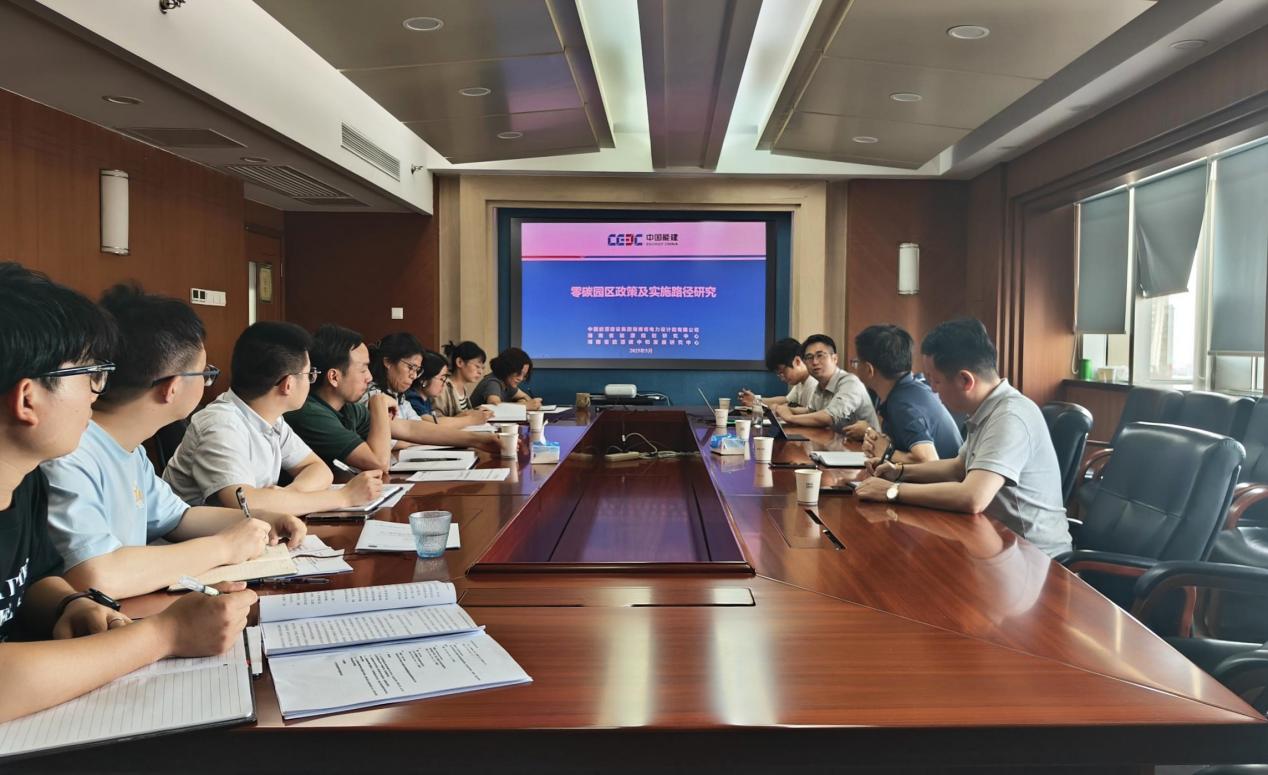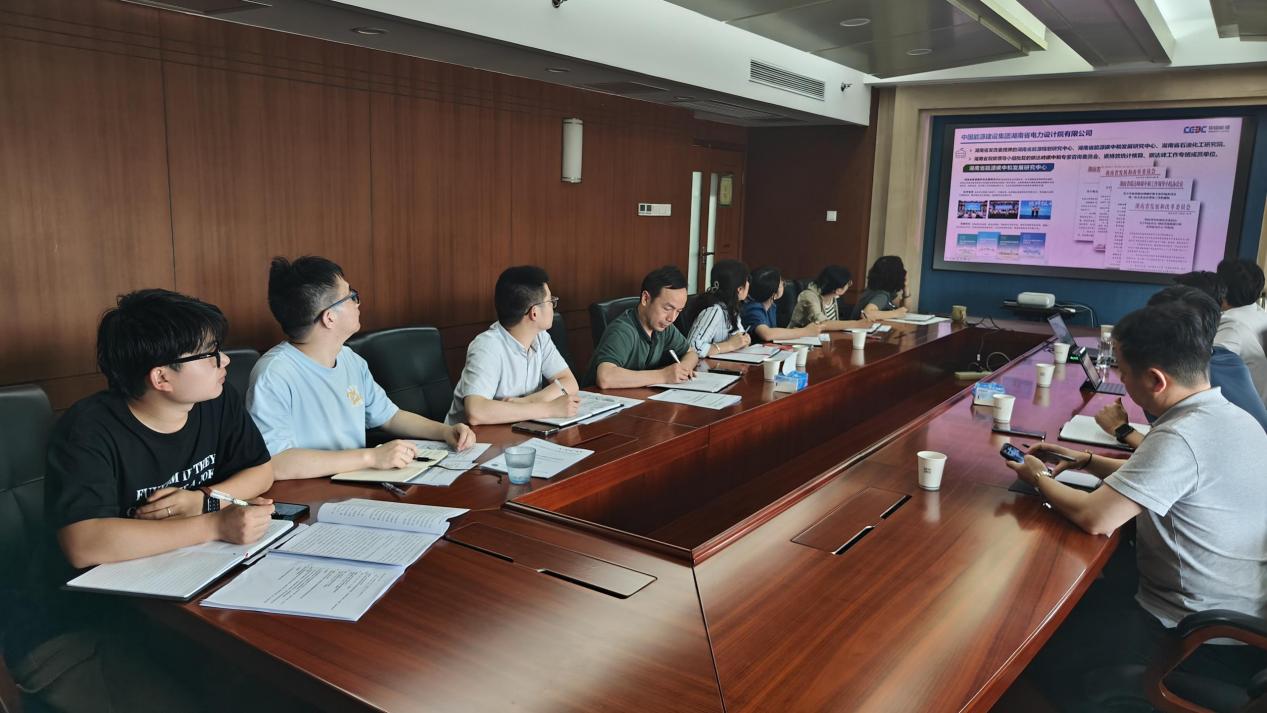
The School of Chemical Engineering held a special lecture on "Research on Zero-Carbon Park Policies and Implementation Paths"
On May 21, the Chemical Engineering Institute organized a special lecture on "Research on Zero-Carbon Park Policies and Implementation Paths." Professor Yu Hu, director of the Hunan Provincial Energy Carbon Neutrality Development Research Institute, and Deputy Director Cheng Yuanlin were invited to give lectures and exchange ideas. Lin Zhiyong, Party Secretary and General Manager of the Chemical Engineering Institute, attended and presided over the lecture. Zhou Niannan, Chief Engineer and Deputy General Manager, Zeng Qiaohong, Deputy Chief Engineer and Director of the Chemical Engineering Planning Research Institute, and members of the planning research team also participated.
Release time:
2025-05-23 11:14
Source:
Chemical Industry Planning and Research Institute
Responsibility:
Miao Chu Yu
On May 21, the Chemical Engineering Institute organized a special lecture on "Research on Zero-Carbon Park Policies and Implementation Paths," inviting Yu Hu, director, and Cheng Yuanlin, vice director, of the Hunan Provincial Energy Carbon Neutrality Development Research Institute to give a special lecture and exchange. Lin Zhiyong, Party secretary and general manager of the Chemical Engineering Institute, attended and presided over the lecture. Zhou Niannan, chief engineer and vice general manager, Zeng Qiaohong, deputy chief engineer and director of the Chemical Engineering Planning Research Institute, and members of the planning research team also participated.
 Cheng Yuanlin delivered a rich and insightful lecture titled "Research on Zero-Carbon Park Policies and Implementation Paths." He approached the topic from three dimensions: "Policy Background of Zero-Carbon Parks," "Current Status and Policy Highlights of Zero-Carbon Park Construction," and "Research on Implementation Paths of Zero-Carbon Park Construction." Combining the Energy Carbon Neutrality Development Research Institute's extensive research on "dual carbon" policies, he deeply analyzed the core policy points related to zero-carbon park construction. Using typical examples such as the construction of zero-carbon parks in Ordos and Yancheng, Jiangsu, he vividly illustrated the implementation paths of zero-carbon park construction. His clear and concise explanation gave the attendees a clearer and more comprehensive understanding of the development and construction of zero-carbon parks.
Cheng Yuanlin delivered a rich and insightful lecture titled "Research on Zero-Carbon Park Policies and Implementation Paths." He approached the topic from three dimensions: "Policy Background of Zero-Carbon Parks," "Current Status and Policy Highlights of Zero-Carbon Park Construction," and "Research on Implementation Paths of Zero-Carbon Park Construction." Combining the Energy Carbon Neutrality Development Research Institute's extensive research on "dual carbon" policies, he deeply analyzed the core policy points related to zero-carbon park construction. Using typical examples such as the construction of zero-carbon parks in Ordos and Yancheng, Jiangsu, he vividly illustrated the implementation paths of zero-carbon park construction. His clear and concise explanation gave the attendees a clearer and more comprehensive understanding of the development and construction of zero-carbon parks.
 Finally, Lin Zhiyong expressed his sincere gratitude to Yu Hu and his team for their lecture and exchange. He briefly introduced the business scope of the Chemical Engineering Institute's planning research work and the relevant situation of chemical parks in the province. He also hoped to strengthen business exchanges and cooperation with the Carbon Neutrality Institute. He encouraged the planning research team to take this special lecture as an opportunity to continuously strengthen their study and research on national and provincial "dual carbon" related policies, deepen their understanding and application, and transform their knowledge into practical work abilities. He urged them to continue to provide high-quality planning and consulting services for government think tanks, chemical parks, and related enterprises, contributing professional strength to the low-carbon and green transformation of Hunan's modern petrochemical industry.
Finally, Lin Zhiyong expressed his sincere gratitude to Yu Hu and his team for their lecture and exchange. He briefly introduced the business scope of the Chemical Engineering Institute's planning research work and the relevant situation of chemical parks in the province. He also hoped to strengthen business exchanges and cooperation with the Carbon Neutrality Institute. He encouraged the planning research team to take this special lecture as an opportunity to continuously strengthen their study and research on national and provincial "dual carbon" related policies, deepen their understanding and application, and transform their knowledge into practical work abilities. He urged them to continue to provide high-quality planning and consulting services for government think tanks, chemical parks, and related enterprises, contributing professional strength to the low-carbon and green transformation of Hunan's modern petrochemical industry.
This lecture not only provided a platform for the Chemical Engineering Institute's planning research team to engage in in-depth learning and exchange with industry experts, clarifying the direction for serving the construction of low-carbon chemical parks from a forward-looking perspective, but also laid a solid foundation of mutual trust for future cooperation between the Chemical Engineering Institute and the Carbon Neutrality Institute. In the future, the Chemical Engineering Institute will continue to deepen industry exchanges and learning, continuously improve its professional service level, and contribute to the green, low-carbon, and high-quality development of the petrochemical industry.
As a high-end consulting think tank for Hunan's modern petrochemical industry, the Chemical Engineering Institute provides policy consulting and interpretation, technical feasibility guidance, process routes and applications, and optimal implementation plans, etc., in line with Hunan Province's requirements, goals, and implementation plans for carbon peaking and carbon neutrality in the petrochemical and chemical industry. This helps the Hunan petrochemical and chemical industry to follow the "Guiding Opinions on Promoting the Standardized Development of Chemical Parks" issued by the Ministry of Industry and Information Technology and the "3060" carbon peaking and carbon neutrality goals. It also helps guide chemical parks and enterprises in the province to adhere to scientific planning, reasonable layout, industrial upgrading, quality improvement and efficiency enhancement, people-oriented and green development, the integration of informatization and industrialization, and improved supporting facilities. Based on the safety improvement and upgrading of "one park, one policy" for chemical parks and "one enterprise, one policy" for chemical enterprises, it jointly promotes the optimization and upgrading of the chemical industry structure, enhances the comprehensive competitiveness of chemical parks and chemical enterprises, strives to create green and intelligent chemical parks, and achieves sustainable and high-quality development of Hunan's petrochemical and chemical industry.
In 2022, the Provincial Department of Industry and Information Technology established the "Hunan Provincial Expert Advisory Committee on Carbon Peak and Carbon Neutrality in the Industrial Field," composed of 34 experts led by academicians. Two professor-level senior engineers from the Chemical Engineering Institute, Zhou Niannan, chief engineer and vice general manager, and Li Jianhua, deputy chief engineer, were selected as members of the provincial expert advisory committee. In 2022, the Chemical Engineering Institute was commissioned by the Provincial Development and Reform Commission to compile the "Implementation Plan for Carbon Peak in Hunan's Petrochemical and Chemical Industry." During the compilation process, on-site investigations were conducted in energy-intensive key areas of the provincial petrochemical and chemical industry. In-depth investigations were conducted at many enterprises in the provincial petrochemical and chemical industry to ascertain the facts and figures. The research focused on process routes and energy-intensive equipment. Relevant policies and materials were collated, and the current energy consumption of key products was quantitatively benchmarked. The current status of the industry's industrial structure and carbon emissions was analyzed. Starting from key product areas, the carbon emission trends and carbon peak timelines of the industry were analyzed and predicted from a point-to-area perspective, and key tasks were proposed. During the compilation process, opinions and suggestions from all parties were solicited to improve the plan, and technical thematic meetings were held many times to exchange and discuss, identify problems, and judge trends. A carbon peak timetable and roadmap for Hunan's petrochemical and chemical industry were proposed, a number of major projects were developed and reserved, a number of pilot demonstration projects were innovated, and a policy system and long-term mechanism supporting carbon peaking and carbon neutrality in Hunan's petrochemical and chemical industry were researched. In accordance with the "Implementation Guidelines for Energy-Saving and Carbon Reduction Transformation and Upgrading in Key Areas of High-Energy-Consuming Industries (2022 Edition)", energy-saving and carbon reduction transformation and upgrading suggestions were proposed for key areas and key enterprises in the province, making the plan both guiding, instructive, and operable.
Latest information
 湘公网安备 43011102001763号
湘公网安备 43011102001763号